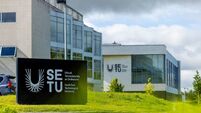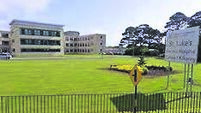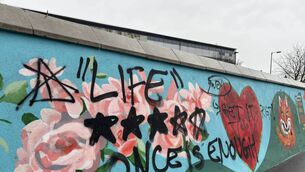Techie find her sweet spot in bees
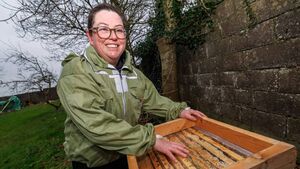
Lorna Nolan of the South Kildare Beekeepers Association tends to one of her hives in Castledermot, Co. Kildare. Photo: michaelorourkephotography.ie
WHEN the sweet scents of honey and propolis (‘bee glue’) waft through the air this spring, you will find Laura Nolan, software engineer and hobbyist beekeeper, lifting the wooden frames from her garden beehives, inspecting each colony carefully and methodically.
“You have to be very slow and gentle with your bees and quite mindful of how you move around them,” she says. “They don’t like a lot of abrupt movements.” For Laura, a lifelong city dweller, this tender interaction with thousands of buzzing insects seems a far cry from the abstract world of coding and algorithms that consume her work days. But in the years since moving to the Carlow countryside at the start of the Covid-19 pandemic, beekeeping has become an unexpected passion – one that has brought her closer to nature, attuned her to the changing seasons and opened up a fascinating window into one of the world’s most complex and co-operative societies.
The seed was first planted decades ago, during her childhood love affair with the Sherlock Holmes mysteries. “Holmes eventually retires to beekeeping,” says Laura. “I’m not retired yet, but having bees was always something in the back of my mind.” When she finally got a garden of her own after relocating from Dublin, the idea resurfaced.
She dove headfirst into researching the theory and science of beekeeping, devouring books and blog posts, joining both the Carlow and the South Kildare Beekeepers Associations. But it was the hands-on practice that truly lit the spark. Her first time peering into a hive, she was mesmerised by the industrious insects, each playing a role in an intricate system.
“A bee colony is thousands of co-operating individuals, and they do it using chemical signalling, food sharing, even the famous waggle dance,” Laura explains.
“From a lot of simple things, a very complex whole emerges. It’s amazing to me to be able to read about this great science that people are doing with the bees and then look in my hive and just see it play out.”
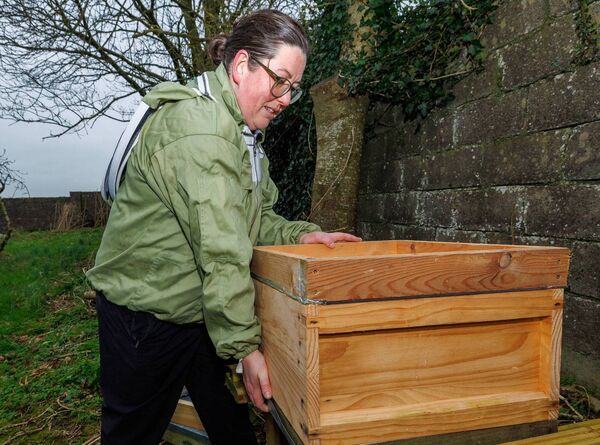
For Laura, beekeeping has also helped her to become more in tune with nature. “I’m a city girl. As far back as I remember, even back to my grandparents, they’ve all been city or town people. I moved down to the Carlow/Kildare border during the pandemic and almost everybody has some sort of link to farming. With beekeeping, it’s really nice for me to get this new link to what’s happening with the seasons because, to be a good beekeeper, even a bad beekeeper! you have to be quite in tune with what’s happening at different times of the year, it’s absolutely crucial to it.” She is also attuned to the environmental challenges of beekeeping. While honeybees aren’t endangered, “how well they are doing without beekeepers at the moment is very much an open question because there are a fair amount of environmental challenges”, says Laura, giving the example of the varroa mite, which arrived in Ireland about 20 years ago.
“Beekeepers have a big role in treating their hives for that and keeping them healthy,” she explains, adding that wet summers aren’t helping either: “There seems to be an increased rate of bees going queenless because in the last couple of summers we’ve had very, very bad weather. If bees are to create a new queen, which they will need to do every couple of years, they require two consecutive days of pretty good weather without rain.” But Laura’s interest goes beyond her own hives. Beekeeping has opened her eyes to broader environmental concerns and the plight of native pollinators. While honeybees aren’t endangered, she explains, some solitary wild bees and bumblebees in Ireland may face risks from disease transmission and habitat loss.
“There are some big questions research still needs to answer about how the honeybee impacts on other species,” she says. “As beekeepers, we can mitigate risks by keeping our hives healthy to reduce pathogens, and supporting biodiversity.” To this end, Laura has also planted a dozen bee-friendly trees on her property and allows some areas to grow wild to provide nesting sites and food for native bees. Beyond the mental stimulation and getting out in the garden, the tech professional says beekeeping has also become a balm for the soul – a meditative practice in slowing down and savouring the moment.
“You open up the hive and it smells amazing, the bees are out and you’ve got this very calm humming. Most days it’s actually lovely.” Laura points to spas popping up in Ireland that have ‘bee beds’ (there’s one in Wicklow and another in Kerry), where bees have made a hive within a cabin and are safely separated from human visitors by a mesh. Participants can lie on a bed, experiencing the buzzing, thrumming hive as a form of immersive therapy.
“You get to have this experience where you sit on top of the hive and you’ve got the smells and the sounds and no bees stinging you. I get why people would do that.” And then, of course, there’s the honey – the literal sweet reward that punctuates the beekeeping calendar. Though her first harvest was small, Laura is hopeful this year’s crop will provide plenty to share with friends and family. But that’s just a bonus. More than anything, beekeeping has become a labour of love and source of endless fascination.
When I ask her what the biggest benefits of beekeeping are, she says: “I think it’s just the happiness that they bring me.”
